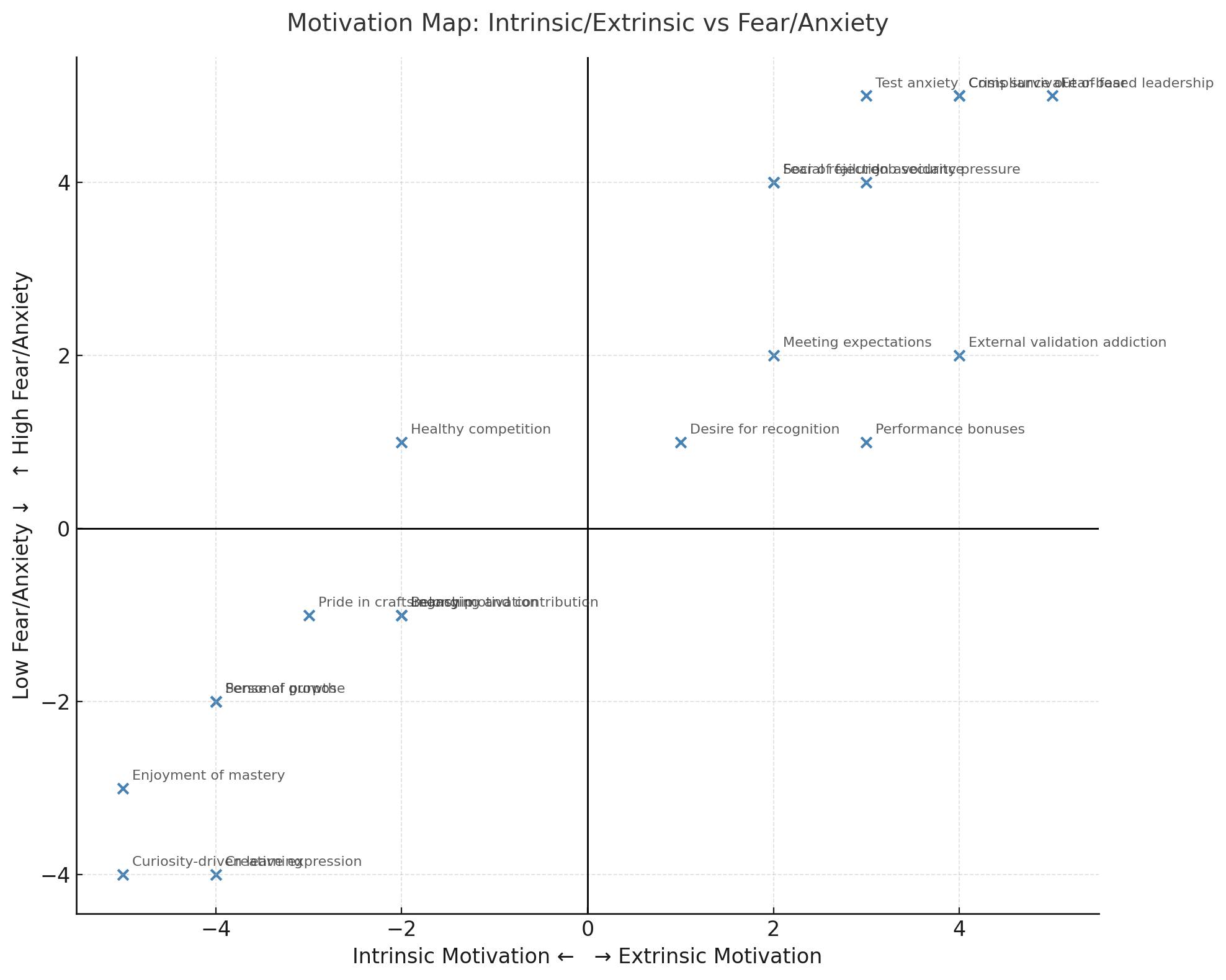Should Fear be Part of a Conscious Culture?
TLDR;
- Fear is one of the biggest motivators, at the risk of causing anxiety
- Increases in extrinsic motivations also trends fear and anxiety
- Autonomy in extrinsic motivations create a healthy sense of fear in the workplace
- Consider if the autonomy exists before hiring into the role
While taking a walk listening to some social media channel, I heard a story about a multi-billion dollar company's CEO making a statement about how he wants his employees to be afraid, to wake up in fear. Instinctively this sounded like a horrid concept, but given that I've never run a business that big before and understand what it takes, I pose no judgement over it.
The following day, I ended up in a discussion with a friend around a few religious concepts, and something she brought up was "A Healthy Fear of God." I had not heard this phrase before, but combining it with the above, it made me question: Is there a such thing as a "healthy fear" at work? Some sort of balance between fear and anxiety. And that begins our journey.
Intrinsic and Extrinsic Motivation
After asking my CEO about the concept of a healthy fear, he suggested I also weigh it against the scale intrinsic/extrinsic motivations to see what I would discover.
If I were to define my utopia business, every employee would be heavily intrinsically self-motivated, passionate about what they do, encouraging themselves through accomplishment or that internal desire to help others. There is little value in extrinsic, external motivations, as they would be used more for appreciation than motivation (such as bonuses). Of course, that is extremely rare.
Having a little fun with AI, I asked for a bunch of examples of motivations, and let's stick estimate each one of them on 2 scales: intrinsic/extrinsic and low/high fear. It came out fairly linear.

So now, that we have this concepts: What would be considered healthy?
Autonomy: The Conscious Requirement of Fear
I lay out a theory: On my extrinsic scale of 0 - 5, Would extrinsic motivation be fine if fear is kept below a 2? That would of course be a little too strait forward and opinionated, but as I researched another key factor came into place: Autonomy.
This now laid out a new theory: Fear from extrinsic motivation works if the employee can autonomously resolve the fear.
So, what exactly does this require? It's time to lean into a few trust behaviors!
- Managing of expectations: the employee needs to know what it takes to overcome the challenge
- Getting Better: The employee may need the resources for training provided to overcome that challenge
One of the systems I love within Improving, where I am currently employed, is a bonus system we call EIP. It provides multiple extrinsic, autonomous motivations:
- Bonuses: The more you are involved beyond your standard job higher the bonus
- Appreciation: Guaranteed recognition from leadership
- Healthy Competition: There is no true value to getting more than others, but people do have fun competing in who can manage more while still showcasing a work-life balance.
One of the challenges with autonomy is that often it involves staying in the creative mindset: Am I able to solve the problem in a way that puts it on me, behaviors I can take, to take control of the situation. Note that discomfort and fear are not the same thing.
The Unhealthy Side of Fear
One of the largest concerns throughout workplaces today is that sustaining a job is not seen as autonomous. Layoffs occur outside provided individual performance metrics. Poor business models from lack of training and over bloating continue to reduce autonomous factors. Blocks of education, such as not permitting the use of AI in the workplace, prevents employees from exploring and increasing their own value.
Anxiety metrics continue to rise every year, and even within my circle of friends the economic unknowns and layoffs are causing so much more anxiety and fear. No one is confident they will be able to sustain their job over the next 3 months, no matter how much training or actions they take: so they are all actively seeking the right job, ones where they are in enough control to conquer their own fears of instability.
This is an opportunity to conscious businesses to rise, those who truly see their employees as both stakeholders and human. Those that focus on clarifying expectations, education, develop creative and abundant mindsets can be "the place to work" within their communities.
The Damage from Stress
Stress has shown to be one of the key causes of inflammation and even insulin resistance throughout the body, and has been one of the root indicators towards cardiovascular issues.
It is easy to assume that fear and stress come hand in hand, the idea that you can't have fear without also causing stress. However, this is the difference between knowing how to take care of things through autonomous means, having the solutions driven by the motivation of fear without the stress from being unable to do something about it.
Summary
So, as you think about your own business and how you run it, can you define that autonomy? Can you honestly tell a recruit: if you do X you will continue to have a job here? (No luck involved) If not, perhaps there needs to be some redefining of the role before you hire, or some thoughts behind the business model itself.